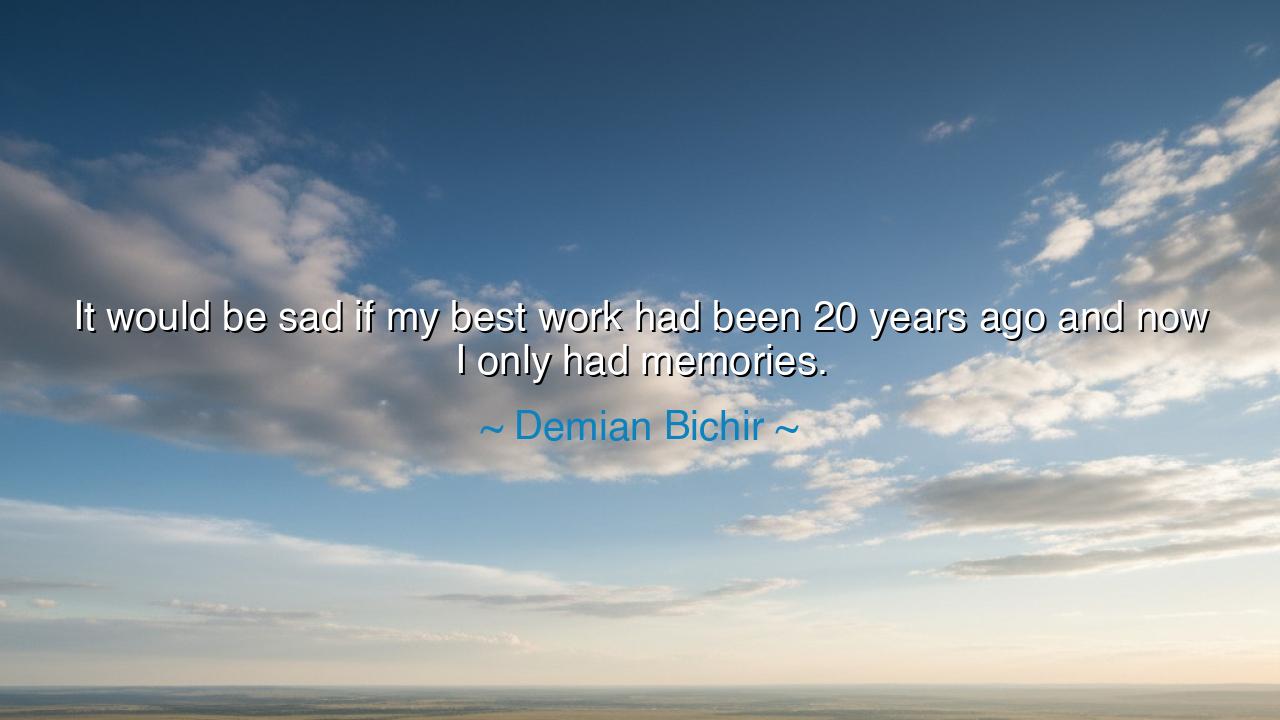
It would be sad if my best work had been 20 years ago and now I






Hear the words of Demian Bichir, spoken with both hope and warning: “It would be sad if my best work had been 20 years ago and now I only had memories.” In this reflection, we hear the cry of the artist who refuses to live only in the shadow of the past. For what is life if not the continual unfolding of creation, the constant striving toward something greater? To be trapped by one’s former triumphs is a sorrow deeper than failure, for it means that the fire of growth has gone out, leaving only embers and remembrance.
The best work is not meant to belong to the past alone. Each season of life holds its own possibility, its own chance for greatness. Bichir’s words remind us that to dwell only on what once was is to wither before one’s time. A man or woman who lives only on the memory of glory becomes like a tree that refuses to grow new branches, content to show only the rings of its age. Such a life may bear the fragrance of nostalgia, but it has lost the vitality of the present.
The ancients often spoke of this. Consider Alexander the Great, who conquered much of the known world before the age of thirty. After his victories, he wept, for there were “no more worlds to conquer.” His glory, though unmatched, had come too soon, and the remainder of his life was haunted by restlessness. His tale warns us of the sadness of reaching the summit too early, and of being left with nothing but the memory of old triumphs. Bichir’s words echo this truth: to live only in memory is to live in a kind of death.
History also remembers Michelangelo, who, even in his old age, refused to rest upon the glory of his youth. Though he had already painted the Sistine Chapel and sculpted David, he continued to create until his final days, chiseling stone with trembling hands. For him, the best work was always ahead, not behind. His life reveals the opposite truth of Alexander’s—that to never surrender to the past, but to press on in creation, is to remain alive in spirit until the very end.
Bichir’s reflection also speaks to the artist’s fear of stagnation, but it is not limited to artists alone. All people risk the temptation to live in their memories: the athlete who recalls his victories, the scholar who remembers her early brilliance, the parent who longs for the days when their children were small. These memories are sweet, but if they become chains, they rob the present of possibility. The human soul is not meant to linger in yesterday, but to strive forward into tomorrow.
The lesson for us is thus: honor your memories, but do not worship them. Let the past inspire you, but never let it confine you. Each day is a chance to create new greatness, whether in your work, your love, or your kindness to others. If you have achieved much, let it be the foundation for more; if you have achieved little, let today be the beginning. The best work is not what you once did, but what you are still capable of doing.
Therefore, live with courage and vision. Refuse to believe that your greatest days are behind you. Seek new challenges, dream new dreams, build new works that will outlast you. For it is not the one who once shone brightly who is most admirable, but the one who continues to shine, year after year, until the final hour. In this, life is not a slow decline into memory, but an ever-rising flame, fed by the will to keep creating. And that flame, once kindled, can never truly be extinguished.






AAdministratorAdministrator
Welcome, honored guests. Please leave a comment, we will respond soon